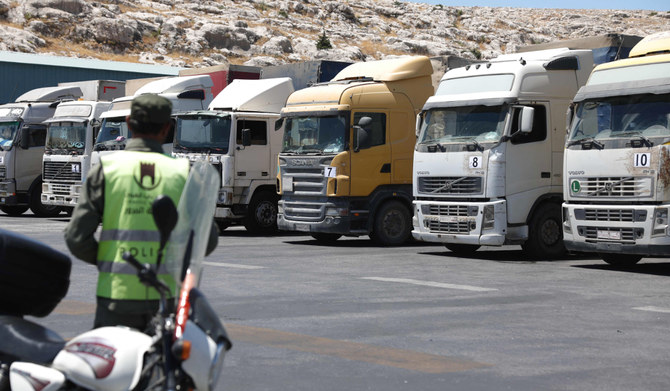UNITED NATIONS, United States: The UN Security Council failed Tuesday to reach consensus on extending a key Syria aid route, throwing into doubt a vital mechanism that provides life-saving support to millions of people.
Russia vetoed a nine-month extension of the agreement allowing for the conduit during a vote at United Nations headquarters in New York, and then failed to muster enough votes to adopt just a six-month extension.
The UN-brokered deal that allows for the delivery of aid overland from Turkiye into rebel-held areas of Syria expired on Monday.
Many council members including the United States, Britain and France have called for a full-year extension, but they backed a nine-month compromise proposed by Switzerland and Brazil.
The proposal was vetoed however by Russia, whose six-month offer only secured China’s support.
US Ambassador Linda Thomas-Greenfield called Russia’s veto “an act of utter cruelty.”
Russian representative Vassili Nebenzia accused Western countries of a “complete disregard” for the interests of the Syrian people and accused them of “artificially” provoking Russia into vetoing.
He also threatened to “close down” the mechanism if support for Moscow’s draft was not forthcoming.
The 15 members of the Security Council had been trying for days to find a compromise to extend the deal, which since 2014 has allowed for food, water and medicine to be trucked to northwestern Syria without the authorization of Damascus.
The vote, first scheduled for Friday, was postponed to Monday — and then again to Tuesday morning.
This means that with humanitarian convoys having wrapped up their operations Monday night, the future of the aid corridor is unclear — it cannot resume operations until the United Nations reauthorizes it.
UN Secretary-General Antonio Guterres said he was “disappointed” by the failure to reach agreement and called on all council members to “redouble their efforts to support the continued delivery” of the assistance.
Floriane Borel of Human Rights Watch said “aid delivery should be based on needs, not politics.”
“Russia’s cynical veto of a cross-border aid lifeline for millions of Syrians is a painful reminder that the Security Council should not be entrusted with decisions about humanitarian assistance,” she added.
The crossing provides for more than 80 percent of the needs of people living in rebel-controlled areas — everything from diapers and blankets to chickpeas. The government in Damascus regularly denounces the aid deliveries as a violation of its sovereignty.
Russia has been chipping away at the deal for years. The accord originally allowed for four entry points into rebel-held Syria before being reduced to one.
The aid mechanism comes up for renewal every six months due to pressure from Damascus ally Moscow.
UN humanitarian affairs chief Martin Griffiths called again last week for the opening of more crossing points, for at least 12 months.
The situation “is intolerable for the people of the northwest, and those brave souls who help them to go through these ups and downs every six months,” he said, pointing out that humanitarian agencies have to bring pre-positioned stock into the country every time access is threatened, in case the crossing is closed.
According to the UN, four million people in Syria depend on humanitarian assistance to survive following years of conflict, economic strife and devastating earthquakes.
After the earthquake in February, which killed tens of thousands of people in the country, Syrian President Bashar Assad agreed to the opening of two additional crossings, which remain open despite the Security Council’s failure to reauthorize the Bab Al-Hawa crossing.
The authorization for these two other corridors is set to expire in mid-August.
Since the earthquake, more than 3,700 UN trucks carrying aid have passed through the three checkpoints. The majority have passed through Bab Al-Hawa, including 79 on Monday.














